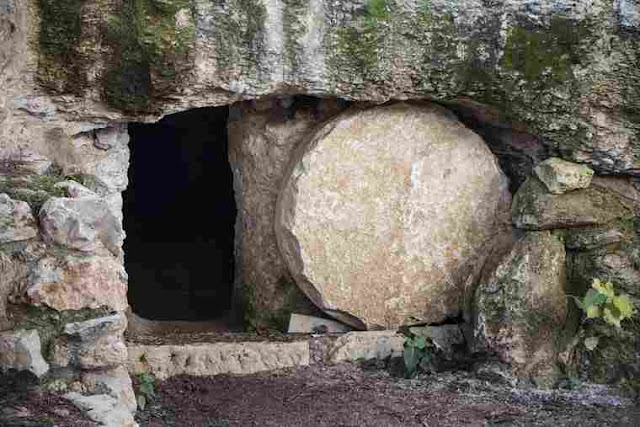Exposition on select Bible verses: Romans 3:27-31
[Romans 3] Verse 27: Where then is the [Jewish] boasting? It is excluded. By what manner of law? of works? Nay: but by a law of faith.
Where then is the [Jewish] boasting? It is plain all through this discussion that Paul has the religious position and opposition of the Jews in mind. Boasting “was excluded at the moment when the law of faith, that is, the gospel, was brought in.”
Where then is the [Jewish] boasting? It is plain all through this discussion that Paul has the religious position and opposition of the Jews in mind. Boasting “was excluded at the moment when the law of faith, that is, the gospel, was brought in.”
In view of this new gospel-revelation of the finished work of Christ, who did the whole work for us on Calvary, and that by God’s appointment, everything is seen to be of God, and not at all of man. Therefore, even the Jews, to whom the Law had been given, had their mouths completely stopped, “because there was no work done,” and no ground for boasting!
By what manner of law? of works? Not at all! but by a law of faith. “Law” in this instance is rule, or plan. This “law,” or principle, of faith, applies not only to our justification, but to every aspect of the believer’s life thereafter,—
“building up yourselves on your most holy faith.”
“That life which I now live in the flesh I live in faith, the faith which is in the Son of God.”
Verse 28: For we reckon that a man is declared righteous by faith, apart from Works of law—This verse is not a conclusion arrived at, but a reason given why boasting is excluded.
Verses 29 and 30: Or is God [the God] of Jews only? [who alone had the Law]. Is He not [the God] of Gentiles also? Yea, of Gentiles also: since it is one God who shall declare righteous the circumcision on the principle of faith, and the uncircumcision through faith.
To paraphrase: “Or is God the God of the Jews only? (as He must be, if justification is by the Law: for only to the Jews did God give the Law). Is He not the God of Gentiles also? Yea, of Gentiles also: since God is One (in His being, and alike to all nations). And He shall justify the circumcision (Jewish believers) out of simple faith (and not by their keeping Moses’ Law though they had it from God), and the uncircumcision (Gentiles, who had nothing) through their faith (apart from His giving them the Law).”
Verse 31: Do we then annul law through faith? Banish the thought! on the contrary, we establish law.
It is the constant cry of those who oppose grace, and most especially that declaration of grace that our justification is apart from law—apart from works of law—apart from ordinances, that it overthrows the Divine authority. But in this verse Paul says, “We establish law” through this doctrine of simple faith.
To illustrate: In the wilderness a man was found gathering up sticks to make a fire on the Sabbath day. Now, the Law had said, “Ye shall kindle no fire throughout your habitations on the Sabbath day.” How, then, was this Law to be “established”? By letting the law-breaker off? No. By securing his promise to keep the Law in the future? No! By finding someone who had kept this commandment always, perfectly, and letting his obedience be reckoned to the law-breaker?[*] No, in no wise!
How then, was the Law established? You know very well. All Israel were commanded by Jehovah to stone the man to death. We read:
“And they that found him gathering sticks brought him unto Moses and Aaron, and unto all the congregation. And they put him in ward, because it had not been declared what should be done to him. And Jehovah said unto Moses The man shall surely be put to death: all the congregation shall stone him with stones without the camp. And all the congregation brought him without the camp, and stoned him to death with stones; as Jehovah commanded Moses” (Numbers 15:33, ff).
Thus and thus only was the commandment of Jehovah established—by the execution of the penalty.
Paul preached Christ crucified: that Christ died for our sins [and that we died with Him, unto sin, unto the Law, unto this world], that “He tasted death for every man.” And that Israel, who were under the Law, He redeemed from the curse of that Law by being made a curse for them. Thus the cross established law; for the full penalty of all that was against the Divine majesty, against God’s holiness. His righteousness, His truth, was forever met, and that not according to man’s conception of what sin and its penalty should be, but according to God’s judgment, according to the measure of the sanctuary, of high heaven itself!
The Jew, prating about his own righteousness, went about to kill Paul, crying that he spake against the Law; whereas it was that very Jew who would lower the Law to his own ability to keep it, instead of allowing it its proper office; namely, to reveal his guilt, curse him, and condemn him to death, and thus drive him to the mercy of God in Christ, whose expiatory death established law by having its penalty executed!"
[*]"The Law required obedience to precepts—or death for disobedience. Now Christ died! If it be answered, that before He died He fulfilled the claims of the Law, kept it perfectly, and that this law-keeping of Christ was reckoned as over against the Israelite’s breaking of the Law, then I ask, Why should Christ die? If the claims of the Law were met in Christ’s earthly obedience, and if that earthly life of obedience is “reckoned to those who believe” the curse of the Law has been removed by “vicarious law-keeping.” Why should Christ die?
Now this idea of Christ’s keeping the Law for “us” (for they will include us among the Israelites! although the Law was not given us Gentiles), is a deadly heresy, no matter who teaches it. Paul tells us plainly how the curse of the Law was removed:
“Christ redeemed us,”
(meaning Jewish believers),
“from the curse of the Law, having become a curse for us” (Gal. 3:13).
And how He became a curse, is seen in Deuteronomy 21:23:
“He that is hanged is accursed of God.”
It was on the cross, not by an “earthly life of obedience,” that Christ bore the Law’s curse!
There was no law given “which could make alive,” Paul says;
There is not in all Scripture a hint of the doctrine that Christ’s earthly life—His obedience as a man under the Law, is “put to the account” of any sinner whatsoever!
That obedience, which was perfect, was in order that He might
“otherwise righteousness would have been by it.”Therefore those who speak of Christ as taking the place of fulfilling the Law for us,—as “the object at which the Law aimed” (Alford); or, “the fulfilment or accomplishment of the Law” (Calvin); give the Law an office that God did not give it.
There is not in all Scripture a hint of the doctrine that Christ’s earthly life—His obedience as a man under the Law, is “put to the account” of any sinner whatsoever!
That obedience, which was perfect, was in order that He might
“present Himself through the eternal Spirit without spot unto God,”
as a sin-offering. It also was in order to His sacrificial death, as “a curse,” for Israel.
The gospel does not begin for any sinner, Jew or Gentile, until the cross:
“I delivered unto you first of all, that Christ died for our sins” (I Cor. 15:3).
And for those under the Law, that was the end (telos) of the law. The Law had not been given to Israel at the beginning as a nation. They came out of Egypt, delivered from Divine wrath by the shed blood of the passover; and from Egypt itself by the passage of the Red Sea; Jehovah being with them. Go now to Elim with its “twelve wells of water and three score and ten palm trees”: there the nation is encamped with their God. They have yet not been put under law at all. The Rock is smitten, giving them drink, and Manna, the bread of heaven, is given, all before Sinai!
Therefore we must believe God when He says in Romans 5:20: “The Law came in [not as an essential, but] as a circumstantial thing.” (The Greek word, pareisēlthe, “came in along-side,” can mean nothing else.)
In Paul’s explanation of God’s dealing with Israel in 9:31-33; 10:5-10; 11:5,6, the meaning of this word telos “end,” appears: that, when an Israelite believed on Christ he was as completely through with the Law for righteousness as if it had never been given. He had righteousness by another way!
The vast discussion among commentators concerning the expression “the end of the Law,” would never have been, had it been recognized: (1) that God gave the Law only to Israel—as He said; (2) that it was a temporary thing, a “ministration of death,” to reveal sin, and therefore the necessity of Christ’s death; (3) that Christ having come, the day of the Law was over—it was “annulled” see Heb. 7:18.
It is because Reformed theology has kept us Gentiles under the Law,—if not as a means of righteousness, then as “a rule of life,” that all the trouble has arisen. The Law is no more a rule of life than it is a means of righteousness. Walking in the Spirit has now taken the place of walking by ordinances. God has another principle under which He has put his saints:
“Ye are not under law, but, under grace!”William R. Newell
Excerpts from Romans Verse by Verse
Chapter 3 & Chapter 10
_______
"Nowhere, except by the Pharisees, is eternal life attributed to law-keeping. Nowhere is Christ said to have gained life by keeping the law either for us or for Himself, and no one who had right thoughts of His person —
"the eternal life who was with the Father and was manifested unto us"
— could entertain the idea for a moment. That the Pharisees, who knew nothing but the law, nothing of Christ nor of their own incapability as sinners to render obedience to the law, should look for eternal life from it is not surprising; but for Christians to take up their language as if it were the exact truth, is to put themselves on the same level in their ideas and feelings as the Pharisees, and to lose sight of the fact that the law itself never so speaks, and that the Lord in His replies to them on the subject is careful to express Himself differently."










